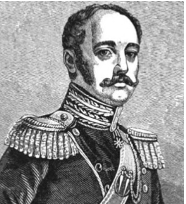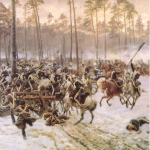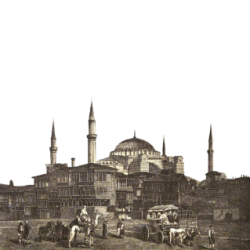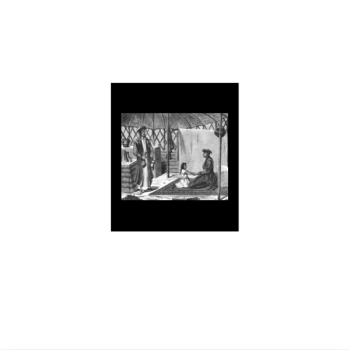INDEPENDENCE
1827-1828
In 1827 Andrei Mikhailovich traveled nearly 3,5000 miles around the colonies. In Simferopol he met the mayor of Kerch, Filipp Filippovich Vigel who would later become known for his posthumously published notes.[1] He was a smart, educated man, but in many ways extremely strange and obstinate. Baron Frank once told Andrei Mikhailovich a telling story about Vigel. Having once gone to Kerch on Holy Week, he found Vigel unwell from a nerve disorder. Vigel met him with complaints and lamentations regarding his unfortunate situation, presenting, among other things, the fact that his apartment there was a Greek Church that often rang bells on Holy Week. He attributed this inconvenience to the malicious intent of the church priest, who supposedly, not knowing how to take revenge on him for some displeasure, and knowing that he had weak nerves, for this reason alone bothered him for a whole week by ringing the bells. Of all the misfortunes that poisoned Vigel’s life in Kerch, as they were described to Baron Frank. This ringing turned out to be the most important.
At the end of his travels, Elena Pavlovna suffered from the lingering complications of rheumatism. Additionally, some sort of spasmodic attacks became attached to Andrei Mikhailovich. This year, auditors from the Ministry of Internal Affairs, Kusovnikov, and Dzhunkovsky, came to see Andrei Mikhailovich. The pretext of their business trip was to ensure the success of the spread of Spanish sheep breeding in the colonies; these successes seemed incredible to the ministry, although they were nevertheless completely real owing to the labors of Kontenius. However, this was only a pretext, as both auditors knew nothing of the matter. The sole purpose was to reward them for this trip. Kusovnikov had a great fortune (he later went bankrupt,) and Dzhunkovsky, a young man, was the son of the director of the department. Both of them, kind and amiable fellows, did not burden Kontenius and Andrei Mikhailovich at all with their useless revision, and everyone had a pleasant time during the visit. Kusovnikov, an extraordinarily original man, amused his hosts with unexpected antics—especially expressions of impatience. He lived in St. Petersburg on the lower floor of his huge house, and he was so impatient that when he saw a person passing by with whom he wanted to talk, he would break the solid glass in the window to speak with them more quickly.
In the year 1828 Andrei Mikhailovich traveled throughout Bessarabia with General Inzov. He stayed for many weeks in the city of Bolhrad due to Tsar Nicholas Pavlovich passing through at the time, and the construction of a garrison for fifty-thousand soldiers. (During the Tsar’s stay in Bolhrad, Inzov petitioned for an additional salary of 1,500 rubles.) The city itself was founded in 1821 by Transdanubian Bulgarians who were fleeing Ottoman oppression. It was Inzov who decided to found the new city on the shore of Lake Yalpug. Huge buildings were built, exchange stores, hospitals, and many houses, for both civilians and military personnel. Inzov was very pleased with the arrival of the Tsar, and the attention shown to him by the august visitor. Inzov conveyed his observations of the Tsar (whom he accompanied everywhere) to Andrei Mikhailovich throughout these days, and he was particularly surprised by the extraordinary memory of the Emperor. In this regard, he was similar to his late brother who was also gifted with an amazing memory and never forgot anything—neither names, faces, nor revenge. Bolhrad would prove very useful in the Russo-Turkish War Campaign (1828-1829,) as it concentrated the heads of economic reserves in the best possible way.[2]

Tsar Nicholas Pavlovich Romanov.[3]
The peace obtained with Persia after the Treaty Of Gulistan (1813) continued until 1826 when Abbas Mirza, the Prince Royal of Persia, actuated by the hope of recovering his favorite hunting ground in the Karabagh, penetrated Russia with a force of twenty-four battalions of infantry, 12,000 cavalry, 8,000 irregular troops, and twenty-four guns. He was encouraged to take this step by the expectation of hostilities in Europe, especially Poland, which was chafing under the yolk of Russian rule. Meanwhile, the Greek insurrection which had continued without intermission since 1820, began to assume a more favorable aspect, That is, it was favorable for the Greeks, not the Ottomans, whose military and economy had taken a hit.[4]
On August 26, 1828, Tsar Nicholas Pavlovich declared war against the Ottoman Sultan, asserting in a manifesto that the Turkish Divan had stimulated the Circassians to revolt; that they had interfered with Russian commerce in the Black Sea; they endeavored to renew the difficulties between Russia and Persia. Immediately after the declaration of war, Tsar Nicholas was determined to be present in person in the camp of the invading army. He repaired instantly from St. Petersburg to the one-hundred-thousand-man army commanded by Field-Marshal Wittgenstein, stationed on the bank of the river Pruth. On May 7, the Russian army crossed the Pruth. Iași and Bucharest, the capitals of Moldavia and Wallachia, were immediately occupied; and the two principalities to be placed under the military government of Count Peter von der Pahlen. At the same time, General Ivan Fyodorovich Paskevich attacked and took the city of Kars, together with the fortress of Poti. These victories were followed up with the capture of the city of Akhalzik. On October 11, 1828, Yusuf Pasha, the commandant of Varna, surrendered to the Russian general, and with that successful event on the side of the invaders, the campaign of 1828 ended. As soon as Varna was occupied by his victorious army, Tsar Nicholas returned as a conqueror to his exulting capital, crowned with laurels, and trophies of triumph. In the campaigns of 1829, General Diebitsch fought hard to win victory for Russia, thus ending the war. In the Treaty of Adrianople (1829, ) General Diebitsch stipulated the destruction of the Turkish fortress in the Romanian city of Giurgievo, and the total abandonment by Turkey of the right bank of the St. George branch of the Danube (to the distance of several miles from the river,) and attempted a virtual separation of the provinces of Moldavia and Wallachia (which were intended to be annexed into Russia.)[5] The Russian Empire was growing, but not everyone was pleased. On May 24th, 1829, Nicholas was crowned King of Poland, to the considerable discontent of that country.[6]
Though France would have another Revolution in 1830, and another king with the July Monarchy, The idea of nation and nationality had changed after the Napoleonic Wars.[7] The hopes of the Pan-Germans were deflated at the Congress of Vienna in 1815. The Holy Roman Empire was replaced with the Deutscher Bund, a loose confederation of thirty-nine German-speaking states. After many long years of fighting, Germans sank into a political torpor.[8] Displays of “German racial pride” manifested largely in scholarship, not politics. This was most evident in 1819 with Heinrich von Stein’s The Monumenta Germanica Historica.[9] The impulse for modern nation-states was felt in populations all over Europe (and elsewhere.) The Serbians fought (and won) independence from the Ottomans in 1817; the Greeks would follow suit in 1832.[10] The Poles would try in 1830 but would lose to Russia in the November Uprising.[11] The coming years would see the next significant philological contributions, beginning with Franz Bopp’s A Comparative Grammar (1833.) It was the most comprehensive comparison between Sanskrit and classical European languages produced up till that time.[12] As previously mentioned, when the Protestant Reformation split the Christian Church of the West, Latin church services were replaced with various European vernaculars, but the notion that language was a system of sacred semiotics and an instrument of divine unity remained. National languages became sacred for the respective state churches, and consequently, modern nationalism, which, in turn, would replace many of the roles that traditional religions provided.[13] The science of language was now a crucial element to the various independence movements, especially the burgeoning “Pan-Slavic” movement. Works like František Palacký’s History of the Czech Nation in Bohemia and Moravia (1832,) Elias Lonnrot’s Kalevala (1835,) based on the old heroic songs collected from the Finnish hinterlands, and P.I. Chafarik’s Slav Antiquities (1837,) supporting their claims with the theories of savants.[14] Croatian intellectuals made a push to have their unique identity recognized on the world stage. They put forward an ideology of Yugo-Slavism (Southern-Slavism,) as an ideology of brotherhood and political cooperation between all Slavs in the Balkan peninsula. They called themselves “Illyrians,” after the (alleged) name of the old pre-Roman inhabitants of the region.[15] The French historian of religion, Ernest Renan, speaking contemptuously of this “scientific offensive,” declared such efforts to be “comparative philology transported into the political field.”[16] Nevertheless, for nations, and those claiming the right to nationhood, language was an incredibly important tool. Prompted by the Illyrian movement, the existence of literary Czech, Slovak, Serbo-Croat, and Slovene would soon come into being, and figure as a backbone of a unified cultural identity.[17]
-
- NOVOROSSIYA
- The Arbiter Of Europe’s Destiny.
- The House Dolgorukuy
- Madame Krüdener
- Ekaterinoslav
- The Arabat Arrow
- The Mystery Of General Inzov
- The Doukhobors
- Pushkin
- Chuguev Military Settlement
- “The Blessed”
- The Decembrists
- Penza
- Independence
- Last Words Of Samuel Khristianovich Kontenius
- “Amid Coffins And Desolation”
- Rusalka
- Dead Souls
- Secret Passages
- Astrakhan
- Nevsky Prospekt
- Kalmyk Ulus
- Love And Ambition
- Duellistes
- Pyatigorsk
- A Heroine Of Our Time
- Winter Palace
- Zeneida R-Va
- Steppes
- Letter To Natalya
- Fire And Ice
SOURCES:
[1] See: Vigel, Philip Philipovich. Notes Of Filipp Filippovich Vigel: Notes On The Current State Of Bessarabia. University Press. Moscow, Russia. (1892.)
[2] Fadeyev, Andrei Mikhailovich. Vospominaniia: 1790-1867. Vysochaishe Utverzhd. Yuzhno-Russkago. Odessa, Ukraine. [Russian Empire.] (1897): Part I: 97-102.
[3] Smucker, Samuel Mosheim. The Life And Reign Of Nicholas The First, Emperor Of Russia. J. W. Bradley. Philadelphia, Pennsylvania. (1858): Frontispiece.
[4] Chesney, Francis Rawdon. The Russo-Turkish Campaigns Of 1828 And 1829. Smith, Elder & Co. London, England. (1854): 1-24.
[5] Smucker, Samuel Mosheim. The Life And Reign Of Nicholas The First, Emperor Of Russia. J. W. Bradley. Philadelphia, Pennsylvania. (1858): 121-133.
[6] A Counsellor At Law. A History Of The Revolutions In Europe Since The Downfall Of Napoleon. A Counsellor At Law. New York, New York. (1831): 312, 316, 325, 356,359.
[7] Marrinan, Michael. “Resistance, Revolution And The July Monarchy: Images To Inspire The Chamber of Deputies. Oxford Art Journal. Vol. III, No. 2. (October 1980): 26-37.
[8] Henderson, W.O. “The Pan-German Movement.” History. Vol. XXVI, No. 103 (December 1941): 188-198.
[9] Mousset, Albert. “Slav Solidarity in the Balkans.” International Affairs (Royal Institute of International Affairs 1931-1939.) Vol. XIII, No. 6 (November-December 1934): 772-791
[10] Repousis, Angelo. “‘The Cause of the Greeks’: Philadelphia and the Greek War for Independence, 1821-1828.” The Pennsylvania Magazine of History and Biography. Vol. CXXIII, No. 4 (October 1999): 333-363.
[11] Leslie, R.F. “Polish Political Divisions and the Struggle for Power at the Beginning of the Insurrection of November 1830.” The Slavonic and East European Review. Vol. XXXI, No. 76 (December 1952): 113-132.
[12] Platner, Samuel Ball. “The Aryan Question As It Stands Today.” The New Englander and Yale Review. Vol. III. No. 252. (March 1891): 205-235.
[13] Saarikivi, Janne; Sinnemäki, Kaius. “Sacred Language: Reformation, Nationalism, and Linguistic Culture.” Chapter in: On the Legacy of Lutheranism in Finland. (eds.) Kaius Sinnemäki, Anneli Portman, Jouni Tilli, Robert H. Nelson. Finnish Literature Society. Helsinki, Finland. (2019): 39-68.
[14] Wilson, William A. “The Kalevala And Finnish Politics.” Journal Of The Folklore Institute. Vol. XII, No. 2/3 (1975): 131-155.
[15] Stipcěvić, Aleksandar. “The Illyrian Reading Rooms in Croatia in the Mid-Nineteenth Century.” Libraries & Culture. Vol. XXIV, No. 1 (Winter, 1989): 69-74.
[16] Mousset, Albert. “Slav Solidarity in the Balkans.” International Affairs (Royal Institute of International Affairs 1931-1939.) Vol. XIII, No. 6 (November-December 1934): 772-791
[17] Auty, R. “The Linguistic Revival among the Slavs of the Austrian Empire, 1780-1850: The Role of Individuals in the Codification and Acceptance of New Literary Languages.” The Modern Language Review. Vol. LIII, No. 3 (July 1958): 392-404; Calic, Marie-Janine. History Of Yugoslavia. Purdue University Press. West Lafayette, Indiana. (2019): 25-37.













